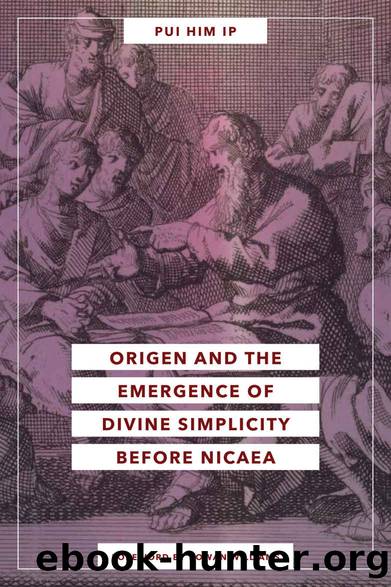Origen and the Emergence of Divine Simplicity before Nicaea by Pui Him Ip

Author:Pui Him Ip [Ip, Pui Him]
Language: eng
Format: epub
Goodreads: 60416239
Publisher: University of Notre Dame Press
Published: 2022-11-14T16:00:00+00:00
Figure 6.1. A Schematic Presentation of Origenâs Account of Patrological and Christological Titles
Source: Expansion of a diagram found in Orbe, Hacia, 1:443.
Note: A = absolute patrological titles; Ba = titles the Son receives from the Father; Bb absolute sonship titles; Bc = relative soteriological titles
Origenâs Anti-Monarchianism
Building on the work of Orbe, figure 6.1 indicates a number of ways Origenâs theory of Scriptural titles fills out the content of the Father-Son distinction.83 By unfolding these possibilities captured in the above diagram, it will be possible to arrive at a more precise determination of the content of Origenâs anti-Monarchianism, his insistence on the distinction between the Father and the Son. It is in the context of Origenâs anti-Monarchianism where one can pinpoint more precisely how divine simplicity differentiates the Father from the Son.
The Transcendence of the Father over the Son as an anti-Monarchian Emphasis: Patrological Titles
The patrological titles reveal the first sense in which Origen distinguishes the Father and the Son in a hierarchical manner. The Father is the single fount and source of goodness, divinity, immortality (A in figure 6.1). In this role he is simple in the sense of The Republic: perfect goodness itself, self-constant, and immutable.84 The Son receives these qualities (Bb) derivatively, that is, through participation in the Father. Since the Son is not fount and sourceâthe formâof the absolute patrological titles, he is not simple. This does not imply that the Son is not good and immutable. But it is as the image of the Father that he acquires these qualities.85 Origenâs account of the absolute patrological titles thus reveals that it is the Father who is most truly simple in the sense of The Republic.
It is possible to show explicitly that Origen developed this emphasis on the Fatherâs transcendence over the Son as an anti-Monarchian emphasis. For ComJn II.12â20, where he develops the formalized account of the Fatherâs transcendence, clearly possesses an anti-Monarchian context. In this section Origen explicitly addresses the Monarchians twice. First, as we have seen in ComJn II.16, he criticizes the Monarchians explicitly. It is in the next paragraph, beginning with the words ÎεκÏÎον Î³á½°Ï Î±á½Ïοá¿Ï, that he immediately turns to developing the formalized scheme for distinguishing between âThe Godâ (= the Father) and âGodâ (= the Son) on the basis of John 17:3. This suggests that he set out the hierarchical scheme directly in response to Monarchian theology. Second, having set out the scheme, in ComJn II.19 Origen explicitly anticipates what resembles an objection from the Monarchians: does the differentiation between âtrue Godâ and âGodâ compromise monotheism? This point arises because Origenâs scheme not only differentiates between the Father and the Son; it actually envisages a more general differentiation between âThe Godâ and everything else that Scripture calls âgods,â including the Son.86 This opens up Origenâs scheme to the objection of polytheism. Does the differentiation between âThe Godâ and âGodââthus implicitly affirming the appropriateness of applying the title to more than one beingâlead to the degradation of the term âGodâ? It is
Download
This site does not store any files on its server. We only index and link to content provided by other sites. Please contact the content providers to delete copyright contents if any and email us, we'll remove relevant links or contents immediately.
The remains of the day by Kazuo Ishiguro(8977)
Tools of Titans by Timothy Ferriss(8366)
Giovanni's Room by James Baldwin(7330)
The Black Swan by Nassim Nicholas Taleb(7109)
Inner Engineering: A Yogi's Guide to Joy by Sadhguru(6785)
The Way of Zen by Alan W. Watts(6601)
Asking the Right Questions: A Guide to Critical Thinking by M. Neil Browne & Stuart M. Keeley(5759)
The Power of Now: A Guide to Spiritual Enlightenment by Eckhart Tolle(5754)
The Six Wives Of Henry VIII (WOMEN IN HISTORY) by Fraser Antonia(5498)
Astrophysics for People in a Hurry by Neil DeGrasse Tyson(5182)
Housekeeping by Marilynne Robinson(4436)
12 Rules for Life by Jordan B. Peterson(4299)
Double Down (Diary of a Wimpy Kid Book 11) by Jeff Kinney(4261)
Ikigai by Héctor García & Francesc Miralles(4247)
The Ethical Slut by Janet W. Hardy(4242)
Skin in the Game by Nassim Nicholas Taleb(4239)
The Art of Happiness by The Dalai Lama(4125)
Skin in the Game: Hidden Asymmetries in Daily Life by Nassim Nicholas Taleb(3991)
Walking by Henry David Thoreau(3953)
